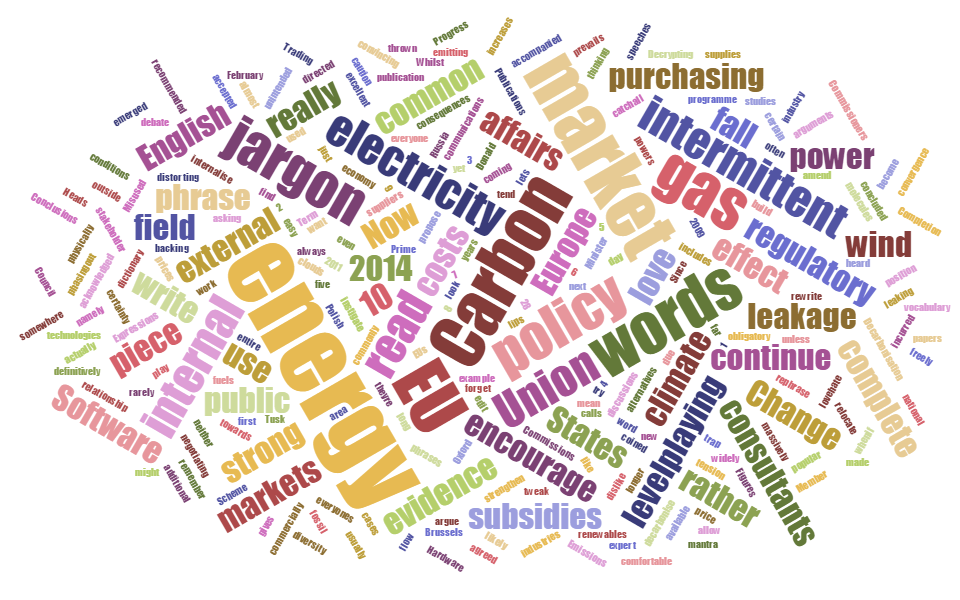Decrypting the EU Energy Jargon
I love words. I work in public affairs and communications, so I love words. As public affairs consultants, we write all day long. We write, rewrite, rephrase, edit, amend, tweak, this is all we do: we play with words, we build strong cases and look for convincing arguments.
Read industry position papers and Commissioners’ speeches, they use the same jargon. This jargon is comfortable. It gives us an ‘esprit de corps’, as it were. However, the jargon also clouds our discussions. As consultants we try not to fall into the trap and propose alternatives. It is not always easy. In the energy policy area, 10 phrases are on everyone’s lips. They are so commonly used that we tend to forget what they really mean and where they’re coming from.
- Energy Union
Term coined in 2014 by then Polish Prime Minister Donald Tusk to instigate common gas purchasing and strengthen the EU’s negotiating powers towards external suppliers Russia. This is now a catch-all phrase for our entire Energy and Climate policy programme for the next five years – which in effect no longer includes obligatory common gas purchasing.
- Decarbonisation
This is not even a word in the English dictionary (about this, I encourage everyone to read the Commission’s publication on Misused English Words and Expressions in EU Publications, which is an excellent read). Brussels is not Oxford, so let’s continue to encourage Europe to ‘decarbonise’ its economy, just like we want to ‘internalise external costs’.
- Level-playing field
You will rarely find a stakeholder not asking for a ‘level-playing field’. More often than not, it will be accompanied by words of caution against ‘unintended consequences’ and calls for the popular ‘regulatory certainty’.
- Energy subsidies
There is a tension about subsidies, almost a love/hate relationship about them. You dislike them unless they are directed to you. Whilst they are widely acknowledged for distorting the market, they can be accepted under certain conditions, for example for technologies that are not yet commercially available. Their phasing-out is recommended, but Member States continue to use them massively, both for renewables and fossil fuels. Figures are usually thrown into the debate, with no strong evidence backing them.
- Carbon Leakage
When I first heard this phrase in 2009, I remember thinking there were actually molecules of carbon physically leaking from somewhere. There are not. In effect, this is about industries likely to relocate outside Europe (and emitting carbon there) due to additional costs incurred by EU climate policy (namely, the Emissions Trading Scheme). Most expert studies have so far concluded that there is no evidence of carbon leakage. This might change when/if the carbon price increases.
- Completion of the internal energy market
Since Heads of States agreed to complete the internal energy market by 2014 (February 2011 Council Conclusions), and to “allow gas and electricity to flow freely”, this has become the mantra of EU energy policy. Progress has definitively been made – with more interconnections, more diversity of supplies and some convergence in prices. But who would really argue that the EU energy market prevails over the 28 national energy markets?
- Hardware
A new piece of vocabulary that emerged with the Energy Union. This is neither a computer nor a piece of electronics, but rather the physical infrastructure needed to complete the internal energy market: gas and electricity interconnections, pipelines, LNG terminals.
- Software
Again, a creation of the Energy Union. Should be understood as the regulatory framework building links between domestic gas and electricity markets and making cross-border flows possible. Be it network codes or the reform of the power market design, they all fall under ‘The Software’.
- Intermittent
Don’t describe renewable energies as intermittent. EWEA, the wind energy association, “recommends using the qualifier “variable” when referring to wind power generation, rather than “intermittent”, which means starting and stopping at irregular intervals.” Now you know.
- Clean coal
A very bold oxymoron, and a good marketing tool to promote Carbon Capture and Storage.
The EU energy lingo goes beyond these few examples. I could expand on ‘windfall profits’, ‘technology neutrality’, ‘capacity mechanisms’, ‘prosumers’, ‘the energy-only market’ and many others. If you have any personal preferences, feel free to share. For my part, I am off writing about the plenary vote on ‘Indirect Land-Use Change’ – my favourite.
1
Find Out More
-
Are you fit for 2024? Communicating in a year of change
February 27, 2024




April 29, 2015 | 4:26 PM
What's your favourite EU Energy Jargon? #eu #energy http://t.co/DZkEBnHdJo